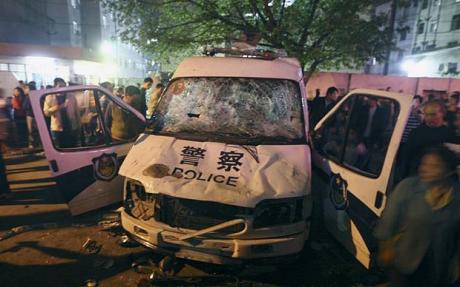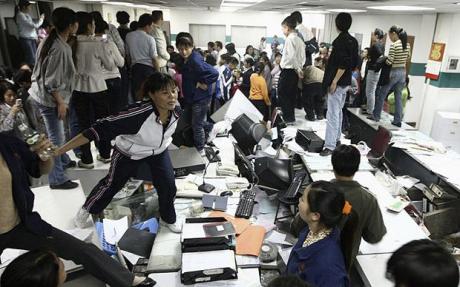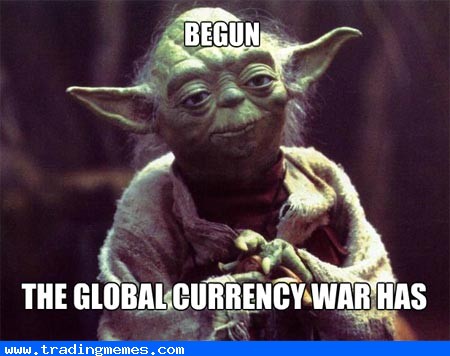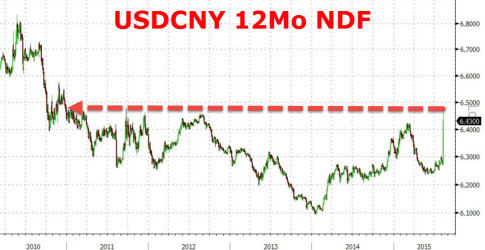One month ago, we first revealed that for one prominent winner from the subprime crisis, Hayman Capital’s Kyle Bass, “the greatest investment opportunity right now” is to short the Chinese Yuan: as he explained “given our views on credit contraction in Asia, and in China in particular, let’s say they are going to go through a banking loss cycle like we went through during the Great Financial Crisis, there’s one thing that is going to happen: China is going to have to dramatically devalue its currency.” He even went so far as to give a timeframe: “we think it’s going to be in the next 12-18 months.”
Then, during the Davos boondoggle, none other than the man who broke the Bank of England, George Soros, noted that he too is shorting the Yuan, which in turn prompted China’s communist party mouthpiece, the People’s Daily to officially warn Soros to back off adding in a petulant, schoolyard bully-ish voice “You Cannot Possibly Succeed, Ha, Ha.” Yes, China really said that.
Bank of China
China’s Central Bank Chief Admits “The Bubble Has Burst”
– China’s Central Bank Chief Admits “The Bubble Has Burst” (ZeroHedge, Sep 5, 2015):
In a stunningly honest admission from a member of the elite, Zhou Xiaochuan, governor of China’s central bank, exclaimed multiple times this week to his G-20 colleagues that a bubble in his country had “burst.” While this will come as no surprise to any rational-minded onlooker, the fact that, as Bloomberg reports, Japanese officials also confirmed Zhou’s admissions, noting that “many people [at the G-20] expressed concerns about the Chinese market,” and added that “discussions [at the G-20 meeting] hadn’t been constructive” suggests all is not well in the new normal uncooperative G-0 reality in which we live.
…
China Enters Currency War – Devalues Yuan By Most On Record
– China Enters Currency War – Devalues Yuan By Most On Record (ZeroHedge, Aug 11, 2015):
Update: The Chinese currency complex is collapsing… 12 month NDFs just hit a new 5 year lows against the USD – biggest plunge since Lehman
S&P futures have retraced most of the day-session gains…
Read moreChina Enters Currency War – Devalues Yuan By Most On Record
China Cuts Rates (Again) In Desperate Bid To Buoy Stocks, Rescue Economy
– China Cuts Rates (Again) In Desperate Bid To Buoy Stocks, Rescue Economy (ZeroHedge, May 10, 2015):
On the heels of last week’s equity rout, China cuts interest rates for the third time since November. The move comes on the heels of last month’s RRR cut and follows trade data that missed expectations (again) and a PPI print that betrayed persistent deflation risks. Perhaps more importantly, Chinese stocks fell last week amid still more rumors that tighter margin requirements are on the way.
…
China And Germany Sign Yuan-Settlement Pact … And Obama Heads To Saudi Arabia
– The PBOC and Bundesbank Sign Pact to Turn Frankfurt into Yuan Hub….Meanwhile Obama Heads to Saudi Arabia (Liberty Blitzkrieg, March 28, 2014):
I haven’t paid too much attention as of late to agreements between China and other nations intended to expand the use of the yuan (renminbi) internationally, because the near-term implications always seem to be exaggerated by many market commentators. That said, this deal between the People’s Bank of China (PBOC) and Germany’s Bundesbank seems quite significant given the importance of Germany within the global economy generally and the E.U. specifically.
From Bloomberg via BusinessWeek:
Germany’s Bundesbank and the People’s Bank of China agreed to cooperate in the clearing and settling of payments in renminbi, paving the way for Frankfurt to corner a share of the offshore market.
Read moreChina And Germany Sign Yuan-Settlement Pact … And Obama Heads To Saudi Arabia
Bank Of China Declares Moratorium On Transfers, Online Banking; Counters Inoperable
– Bank Of China Declares Moratorium On Transfers, Online Banking; Counters Inoperable (ZeroHedge, June 24, 2013):
From Caijing, google translated. We hope the gist of the narrative in Mandarin is far less scary, because if the translation is even remotely accurate, then all hell may be about to break loose in China.
Bank of China, Bank of suspension of transfers morning counters were unable to apply for online banking
Update: Customer service said, now silver futures transfer service has been fully suspended, online banking, the counter can not be handled, and now has the background system response, recovery time is not yet known
Following the ICBC, the Bank of China also go awry again. This morning, the Bank of China Bank moratorium on transfers, online banking, counters are inoperable.
10:00 many, many people began to receive messages sent to the Bank of China, “the end result of the Bank of China Bank failures, bank customers can not carry on through the Bank transfers, please Bank online banking, bank counter or use of other bank transfer system, Bank system will be restored promptly notify you.” large number of transfer business banking needs of the people turned to online banking, counter, but according to the instructions of the public still found text messages can not handle.
Reporters call the BOC, customer service said, now silver has been fully suspended phase transfer services, online banking, the counter can not be handled, and now has the background system response, recovery time is not yet known.
Read moreBank Of China Declares Moratorium On Transfers, Online Banking; Counters Inoperable
The Reflation Party Is Ending As China Withdraws Market Liquidity For First Time In Eight Months
– The Reflation Party Is Ending As China Withdraws Market Liquidity For First Time In Eight Months (ZeroHedge, Feb 19, 2013):
Since institutional memories are short, it is time to remind readers that it was the threat, and subsequent reality, of China overheating in the spring and summer of 2011 (when record high food prices sent the entire North African region in a state of coordinated revolt and gradually moved far east), when even the Great firewall of China could not block news of frequent break outs of localized violence from hungry and angry mobs, that halted and broke the spine of the great reflation trade then (and yes, 2013 has so far been a carbon copy replica of 2011 as we summarized in “It’s Deja Vu, All Over Again: This Time Is… Completely The Same“).
Furthermore, as only Zero Hedge forecast back in mid-2012, when ever other commentator was shouting over the rooftops that an RRR or interest rate cut out of Beijing was imminent, the PBOC would be the last to stimulate the market with monetary easing as it was well-aware that an entire developed world reflating at the same time would hit none other than China the fastest as the hot money flew straight into Shanghai. Just as it did in 2011. So instead China proceeded to engage in a series of daily reverse repos, or ultra-short term liquidity injections that prevented the advent of wholesale inflation: after all the Fed, the BOJ, the ECB and soon, the BOE, were doing it for them. And the last thing the country with the highest allotment of CPI, or book inflation, to food and energy can afford, is to let foreign central banks dictate its price level. After all, it has more than enough of its own.
Well, the Chinese New Year celebration is now over, the Year of the Snake is here, and those following the Shanghai Composite have lots to hiss about, as two out of two trading days have printed in the red. But a far bigger concern to not only those long the SHCOMP, but the “Great Reflation Trade – ver. 2013″, is that just as two years ago, China appears set to pull out first, as once again inflation rears its ugly head. And where the PBOC goes, everyone else grudgingly has to follow: after all without China there is no marginal growth driver to the world economy.
End result: China’s reverse repos, or liquidity providing operations, have ended after month of daily injections, and the first outright repo, or liquidity draining operation, just took place after eight months of dormancy.
Chinese authorities took a step to ease potential inflationary pressures Tuesday by using a key mechanism for the first time in eight months.
The move by the central bank to withdraw cash from the banking system is a reversal after months of pumping cash in. That cash flood was meant to reduce borrowing costs for businesses as the economy slowed last year—but recent data has shown growth picking up, along with the main determinants of inflation: housing and food prices.
China Central Bank Refuses To Join Global Print Fest, Warns About Inflation Risks
– China Central Bank Refuses To Join Global Print Fest, Warns About Inflation Risks (ZeroHedge, Oct 12, 2012):
While the entire ‘developed’ world is now openly engaged in destroying the balance sheet of its assorted central banks – the sole means to devalue local currencies, a liability, by accepting ever more toxic ‘assets’ as currency collateral – thereby pursuing strategies which until now were strictly relegated to the banana republic playbook, there are some countries who see what is coming over the horizon, and refuse to join the printing frenzy. One such place is China, for whom, as we have repeatedly shown the threat of a fast onset of inflation is far greater (3x more bank deposits as a % of GDP than in the US, means a soaring capital market as a result of inflation will benefit far less while a deposit exodus will cause hyperinflationary havoc in minutes) than any other developed world country. And with the inability to hide “non-core” CPI as a result of food and energy being such a greater portion of overall inflationary bean counting than in the US, it means that despite the demands of Tim Geithner for immediate more easing by China, the PBOC is now stuck waiting to import everyone else’s inflation: this includes the Fed, ECB, BOE, BOJ, Korea, Australia and all other bank engaged in adding liquidity, while its own hands are quite tied. Because recall that it was only last year that the NYT said that: “Inflation in China Poses Big Threat to Global Trade.” Now we are told that lack of inflation poses the same threat, when in reality what they mean is that with the world tapped out, one more source of marginal liquidity is needed. Judging by overnight comments from the PBOC’s head Zhou Xiaochuan that liquidity, suddenly so very needed to keep the game of musical chairs going, is not going to come from China just as we have warned for months on end.
From Reuters:
China’s central bank governor has warned that quantitative easing policies worldwide could cause inflationary risks, state news agency Xinhua said on Saturday.
Read moreChina Central Bank Refuses To Join Global Print Fest, Warns About Inflation Risks
Bank of China furious at Deutsche debt move
Investors in bank debt are threatening to boycott lenders that follow Deutsche Bank in breaking an unwritten rule and failing to exercise a call option on subordinated debt.
In a co-ordinated action, angry bond investors are writing to bank treasurers and investor relations heads telling them that any failure to exercise a call option will be considered a breach of trust that could cause all the issuer’s debt to be shunned.
Related article: Others may follow Deutsche on bond calls-Moody’s
Deutsche stunned the debt market last week by choosing not to redeem €1bn (£932m) of subordinated lower tier 2 bonds because to do so was cheaper than refinancing. But though the move saved Germany’s biggest bank up to €150m, it caused fury among buyers of the debt who worked on the assumption that bonds would always be redeemed at their first call date.
The letter, seen by The Independent, said a bank’s decision not to call debt would be taken to mean “the institution is in such difficulty that it is an impossibility to call the instrument or the institution feels that it is in such a strong position that it can afford to alienate itself from the support of a wide portion of the fixed-income institutional investor community”.
Bank of China, a major buyer of bank debt, has gone further in its communication with issuers. The giant Chinese lender’s Hong Kong operation has told banks that “any non-call by a given institution will result in that institution’s debt (not just lower tier 2 but senior and tier 1 as well) being ineligible for future investment consideration”.
Bank of China added that Deutsche Bank had also been removed from consideration as a counterparty for any credit derivative transaction in future.
China slashes interest rates as panic spreads
The People’s Bank of China cut interest rates by more than 1pc point as the economy crumbles and millions of jobs are predicted to go ahead of Christmas.

Factory workers surround a damaged police car during a protest outside Kai Da toy factory in Dongguan, China. Photo:REUTERS
The move came just one day after the World Bank predicted that China would grow by 7.5pc next year. The level of growth may appear robust by Western standards, but it would represent the slowest economic expansion in China for the last two decades.
It is also perilously close to the 7pc minimum level of growth that Chinese economists believe is necessary in order to create enough jobs for the 6m university graduates who will enter the jobs market next year.

Factory workers smash an office during a protest at Kai Da toy factory in Dongguan, China. Photo: REUTERS
It is the fourth interest rate cut from the Chinese central bank in the last ten weeks as the government desperately battles an evident economic collapse. “China is out to save itself here,” said Patrick Bennett, an analyst with Societe Generale in Hong Kong.
The PBOC reduced its main borrowing rate by 1.08pc points to 5.58pc, the biggest one-off cut since the Asian Financial Crisis in 1997.
In recent weeks, a series of riots across central and southern China have flowered as disgruntled employees aired their grievances at the downturn.
Main Bank of China Is in Need of Capital

Dollar and yuan currency at a bank in China. China’s central bank has accumulated about $1 trillion in United States debt.
HONG KONG – China’s central bank is in a bind.
It has been on a buying binge in the United States over the last seven years, snapping up roughly $1 trillion worth of Treasury bonds and mortgage-backed debt issued by Fannie Mae and Freddie Mac.
Those investments have been declining sharply in value when converted from dollars into the strong yuan, casting a spotlight on the central bank’s tiny capital base. The bank’s capital, just $3.2 billion, has not grown during the buying spree, despite private warnings from the International Monetary Fund.
Now the central bank needs an infusion of capital. Central banks can, of course, print more money, but that would stoke inflation. Instead, the People’s Bank of China has begun discussions with the finance ministry on ways to shore up its capital, said three people familiar with the discussions who insisted on anonymity because the subject is delicate in China.
People’s Bank of China powers into Britain
China’s central bank has acquired a secret stake in Drax, the owner of the UK’s biggest coal-fired power station.


